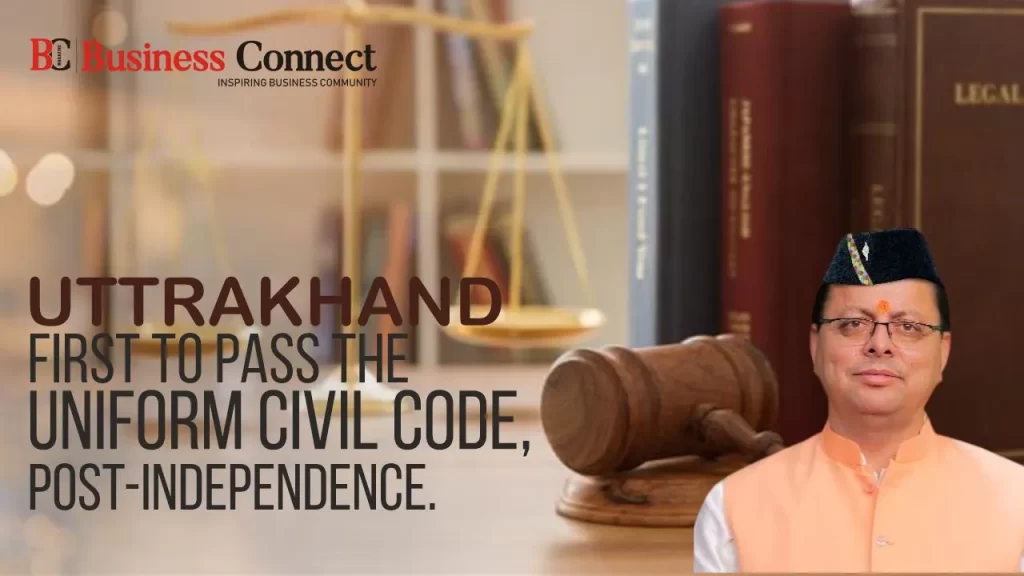Written by: Geetanjali
Uttrakhand: First To Pass The Uniform Civil Code, Post-Independence.
History in the making, hilly state of North India, Uttarakhand becomes the first state to pass The Uniform Civil Code post- Independence. The Uniform Civil Code Bill was tabled by Chief Minister Pushkar Singh Dhami at Uttarakhand’s Legislative Assembly on Feb,6,2024.
The Uniform Civil Code bill was passed in the assembly amid opposition’s demand to form a committee to review the draft bill. It was a long awaited bill, which was in talk for the last 2 years in the state. At the national level BJP led central government had tried to present UCC at the lok sabha “lower house” on multiple occasions, however they had to pull back every time due to opposition.
Mr. Dhami said, “He appreciates all the members of the assembly as today the long awaited UCC bill was passed” while repeating UCC’s commitment in the assembly.
Though Goa already had Uniform Civil Code( Portuguese Civil Code)but was implemented before India’s Independence under Portuguese rule and hasn’t been updated since its liberation in 1961.
The draft bill was formed by a five member panel committee chaired by (Retd.) Supreme Court Judge Ranjana Prakash Desai. It took around two years during which the panel had 43 dialogues and 72 meetings to put together the whole report. The bill includes 7 schedules and 392 sections.
UCC will surpass the old personal laws. Will ban practices like polygamy, halala, iddat, and provide a legal framework for matters like marriage, maintenance, registration of live-in relationships, adoption, succession, mandatory registration of marriages, and divorce without discrimination on the basis of faith and religion.
Uniform Civil Code sets marriageable age, for women as 18 years and 21 years for men from all castes, communities and religions. The state has a tribal population of about 3% which are exempted from UCC( exemption only for notified tribes).
Uniform Civil Code is guided by Article 44 of the Indian Constitution which refers to the DPSP(Directive Principles of The State Policy), DPSP states that the government should form some unified laws for its citizens.
Let’s read some key points of the Uniform Civil Code Bill:
# Mandatory registration of live-in relationships:
The Uniform Civil Code aims to regulate and recognize live-in relationships in Uttrakhand. Until now, there was no definite law to regulate live-in relationships in the state. After implementation of the bill it will be mandatory to register a live-in relationship if a couple wants to rent out property or buy land in Uttarakhand.
Couples must register their relationship, failing to do so can result in three months of imprisonment and up to Rs.10,000 fine. In case registration filed for a live-in found out to be false, will result in six months of jail term and a fine up to Rs. 25,000. Child born out of a live-in relationship will be considered legitimate and will have equal legal rights with a child born out of a marriage. Also, if a woman gets abandoned, she will be entitled to maintenance by her partner.
# Age of Marriage, equal for all.
Marriageable age, for womens is set to be 18 years and 21 years for men, is made equal for everyone without any discrimination based on faith and religion. Uttarakhand implemented the Compulsory Marriage Registration Act in 2010, it became compulsory for the couples to register their marriage in six months, before 2010 alone one party could register their marriage and it was optional to register one’s marriage.
Under UCC registration of marriages and divorces across all faiths is mandated within 60 days of the ceremony, failing to do so can result in a fine up to Rs.10,000.
# Children out of Wedlock will be legitimate.
After, UCC children born out of a live-in relationship or outside of wedlock will be considered legitimate, will have equal rights over their parents property and all other legal rights applicable to children born out of marriage. Earlier,only children born out of wedlock were considered legitimate heirs of parents ‘ property. Son and daughters(married or unmarried), will have equal rights on parents property and so will the adopted child.
# Equal Distribution of property after death.
Earlier property of a deceased who has died without a registered will was directly transferred to his mother’s name. Now, after the implementation of UCC property of a deceased who has died without a registered will, will be equally distributed among his immediate family members. In case of no immediate family, the property will be equally distributed among the next closest family members, like cousins from the paternal side.
# 3% of tribal community, exempted from UCC.
The state has a notified tribal population of around 3% who will be exempted from provisions of Uniform Civil Code and are free to follow their respective personal laws. Due to this exemption political critiques seem to be unhappy as there will be no uniformity if scheduled tribes are getting exempted from UCC.



